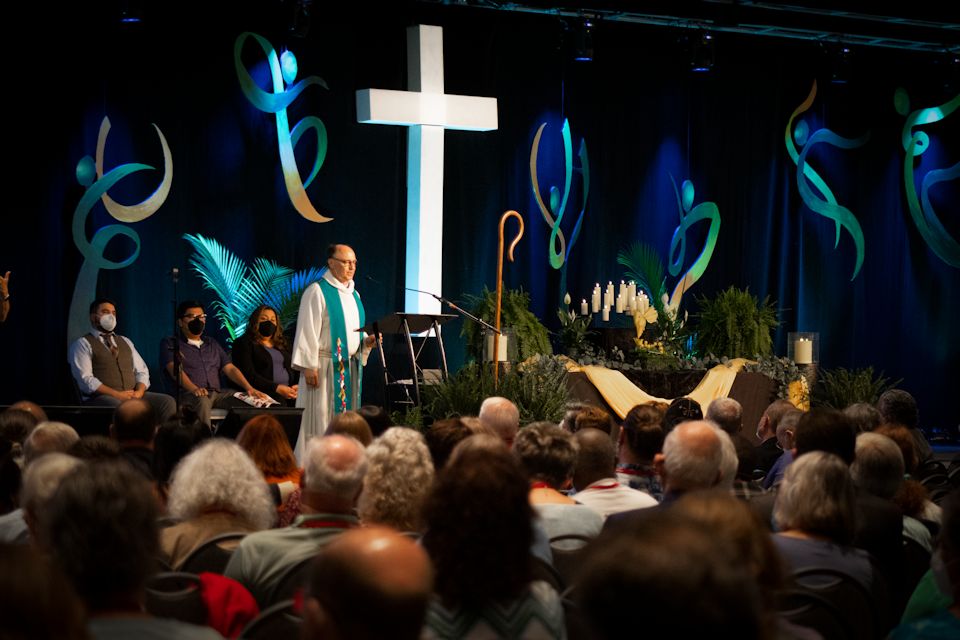Bold & Effective Leaders. Vibrant Congregations. Ministry and Mission. These Christ-centered aspects of the Michigan Conference’s vision inspired conference members to embrace their story.
KAY DEMOSS
Senior Content Editor
June 2, 2022 | ACME, Mich. – During the opening moments of the plenary session on Thursday afternoon, Bishop David Bard shared his outlook on “The State of the Church.” He began by saying, “This is a challenging time for the church and the world, and we cannot ignore that If we cannot mourn, how alive are we?”
Emphasizing that “Resurrection is how God works!” the bishop reminded members of the Vision of The Michigan Conference. “Our Michigan Conference is Christ-centered. Our vision for life together, for our work in ministry together is Christ-Centered. Christ-centered mission and ministry. Christ-centered bold and effective leaders. Christ-centered vibrant congregations. This vision remains our focus as an annual conference.”
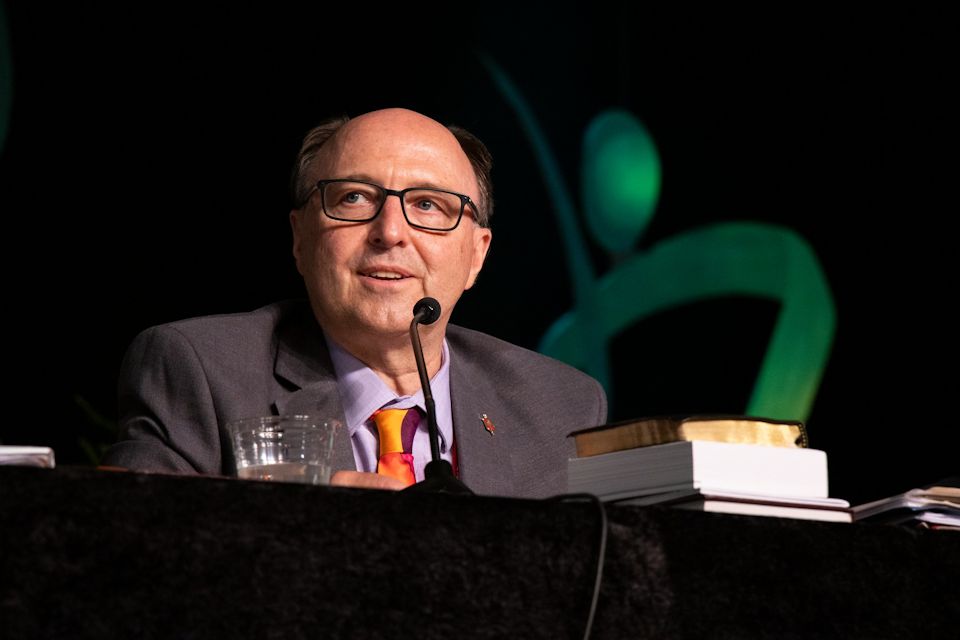
It was against that background that Bard lifted two areas for concern. “We know if we are to fulfill that vision, part of our necessary work is anti-bias/anti-racism work.” He announced that the ABAR Working Group will launch programs for education and training this summer. The bishop continued, “We are in the midst of a prolonged separation.” He noted that until the Judicial Council rules, the Michigan Conference will work with Paragraph 2553 as churches choose to disaffiliate.
He concluded on a hopeful note, “As followers of Jesus, there are more reasons to dance than to mourn.” He encouraged members to remain open “to how the Holy Spirit transforms us. Tune into God’s unforced rhythms of grace.”
This was the first of many times that the bishop called attention back to the vision of the Michigan Conference during the course of the next three days. As the Rev. Paul Perez noted in his post-conference blog, “This year, there was a conscious effort to rebalance our Conference, prioritizing the revival and fellowship dimensions. There was a felt need for those of us planning to reconnect with God, ourselves, and each other.”
The ”new beginning” called for by the bishop was not meant as a return to where we were when Conference last adjourned in person in 2019. The vision of the Michigan Conference was presented through the lens of trauma – trauma caused by COVID, the tensions within the denomination, and stress in our nation and culture.
Christ-Centered Bold & Effective Leaders
On Friday afternoon the focus was on Christ-Centered Bold & Effective Leaders. The first of three panel discussions, “Leadership in a Time of COVID,” was led by the Rev. Debbie Thomas, co-pastor of Redeemer Church, DeWitt and St. Johns campuses. Joining her were the Rev. Christopher Hintz, co-pastor of Marquette Hope, and Maddy Martinson, Discipleship Director at Marshall UMC. Hintz said, “Enough has been a guiding principle for me. What we are doing is enough.” He added, “This is an opportunity to celebrate the great re-set that has been handed to us. The future looks exciting and offers new possibilities.” Martinson offered, “I learned from Kathy Pittenger to ‘Remember your WHY.’ We are all leaders in ministry, but it can sometimes be difficult to remember why we are doing something.” Thomas noted, “I’ve learned flexibility and vision. As a leader, I love to get together and get a plan so we all know what we are doing. These last two years, I must accept this is the plan as we know it … I am more patient in the process.”
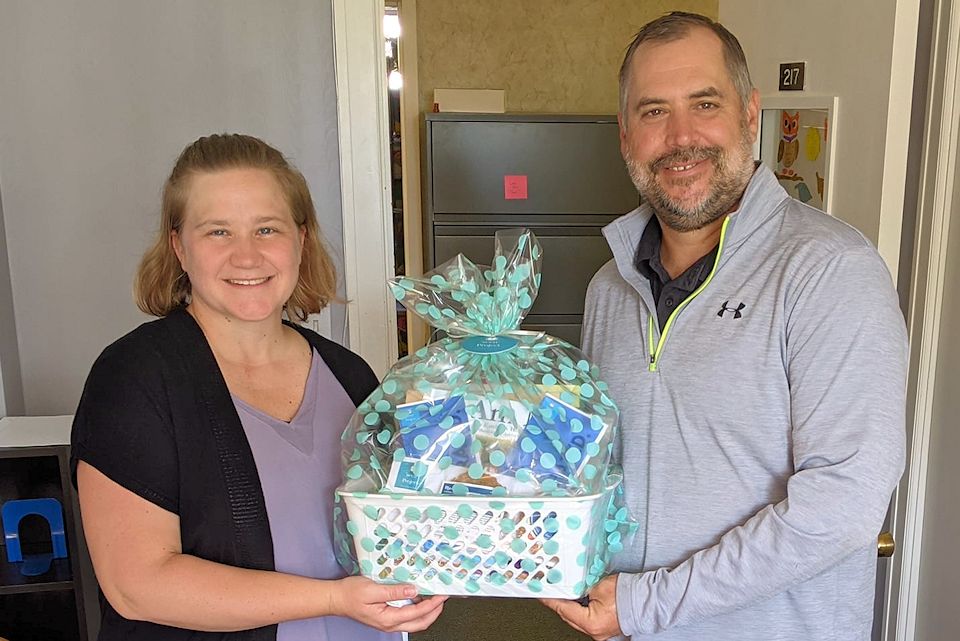
Laura Witkowski, Michigan’s Associate Director of Lay Leadership Development, shared with the Conference a new conference-wide strategy to develop leaders called incubation. “We as a conference need to develop habits of innovators,” she said. The Rev. Dr. Anthony Hood, the pastor at Farmington: First UMC, was part of the planning. Hood stated the aim to, “equip and empower leaders in ways that bring joy and confidence to the ongoing work of the Spirit.” Hood lifted up the Hispanic Youth Leadership Academy (HYLA) as an example of a program that empowers Latinx youth.
Gerry Conti, a layperson from Ypsilanti: First UMC, shared an additional four pilot programs of the Incubation project: Coaching, Cohorts on various interests, Enneagram, and Seed to Harvest. She invited conference members to participate in one of the five. Conti concluded, “The purpose of our leadership development is to strengthen current gifts and talents and learn new skills for leading where God calls us, in diverse contexts, communities, and ministries.” Read the full report here.
Hundreds of faithful, bold, and effective leaders partner with the Holy Spirit across The Michigan Conference. Find their names in the Nominations Report.
Christ-Centered Vibrant Congregations
As the Saturday morning plenary began, Bishop David Bard said, “As a conference we have in our vision that we will be centered in Jesus Christ and work together for the vibrancy of our congregations.” That focus began with a video telling the story of how congregations in Flint offered hope and healing during the water crisis. (find the video at 1:46) The Revs Gregory Timmons (Flint: Calvary UMC) , Tommy McDoniel (Asbury UMC), and Jeremy Peters (Court Street UMC) shared how COVID did not slow down their congregations’ care for their community. Instead, they pivoted to connect with people in new ways to deal with the double health crisis of water and virus.
A second panel discussion addressed “Trauma-informed Congregational Ministry,” led by the Rev. Christy Miller White, Conference Coordinator of Youth Initiatives and staff at Clarkston UMC. She addressed questions to Michelle King, Deacon serving Gryphon Place in Kalamazoo, the Rev. Albert Rush, pastor of Eastpointe: Immanuel UMC, and the Rev. Linda Stephan, associate pastor at Traverse City: Central UMC. Rush explained that the persons coming to the food pantry jumped from 35 to 150 during COVID. When they were hit with the flooding in the early summer of 2021 and lost $10,000 of groceries, “The community sent the word out and brought in food. We became a hub” for feeding hungry people. King reminded the conference that “mental health is a long journey. Look at your congregation and notice who is there and who is not. Follow up with those missing just to see how they are doing NOT to get them back to church.” Stephan counseled churches to “give young families permission to be rather than to do. They are so overwhelmed right now.” She mentioned the “porch fairies” program that leaves goodies at the homes of young families to remind them “they don’t have to go it alone.” White lifted up trauma-informed resources available on the website and said more were coming soon.
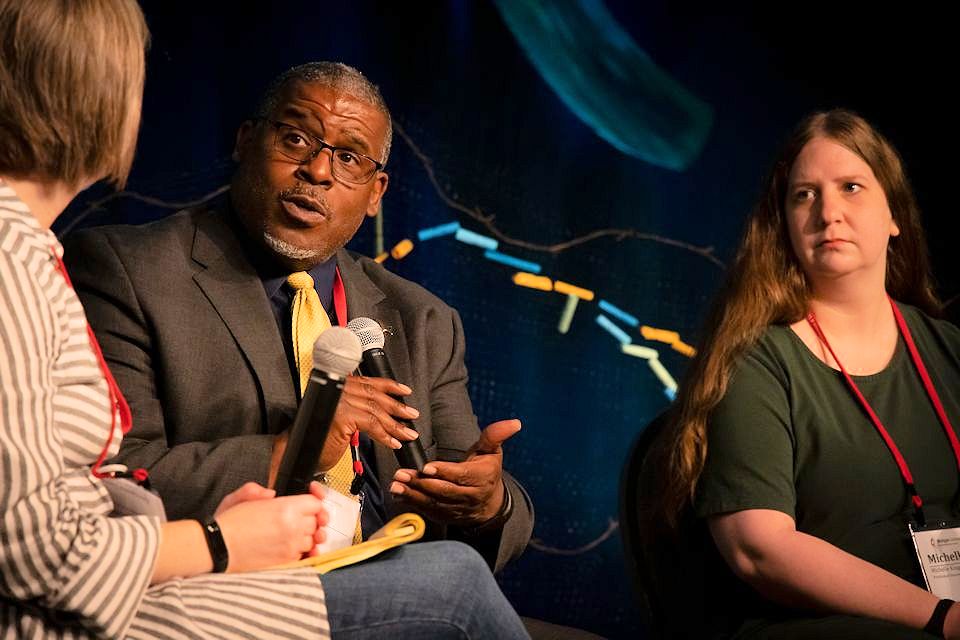
Other expressions of congregational vibrancy were shared by the Rev. Dirk Elliott, Conference Director of Congregational Vibrancy and Leadership Development. He presented the Harry Denman Award to the Rev. Craig VanBeek (Burnips and Monterey Center UMCs) and Michele Westin (Flint: Asbury UMC). Their efforts have generated vibrancy in their congregations and communities. VanBeek was called a “force for good in the community with impact beyond the village limits. Elliott called Westin, “a tireless worker for the Lord and true servant of God.”
The Rev. Ken Sloane, Discipleship Ministries, was on stage to present their One Matters Award to New Heart UMC in Saginaw. Pastor Melene Wilsey received the award on behalf of the congregation. Elliott said, “All they do is for the purpose of introducing people to the saving power of Jesus.” (See story …. )
Elliott celebrated five new church initiatives. Marquette Hope “is the first four-campus church in the Michigan Conference.” Sycamore Creek in South Lansing has expanded to three campuses with the recent adoption of Lansing: Asbury UMC. Garden City UMC has started Graceful Journey to reach special needs families. Finally, two digital campuses are going “beyond live streaming, to connect in deeper ways with the online community.” Birmingham/Berkley First and Plymouth First UMCs have added staff to lead that effort.
Christ-Centered Mission & Ministry
When conference members returned from lunch on Saturday afternoon, they were met with the third emphasis of Christ-centered vision. Another panel, with the focus, “Churches Engaging Communities for Healing and Well Being,” was led by Audra Hudson, CMU Wesley Director and Secretary of Global Ministries for The Michigan Conference. She was joined by Amee Papparella (Kalamazoo: Sunnyside UMC), Patricia Gandarilla (Centro Familiar Cristiano UMC), and Kim Bos (Director of Big Rapids Wesley). Gandarilla talked about the summer program providing a safe place for children while parents are at work. “The world is broken but making little disciples at the church is a way to transform the world.” Bos encouraged conference members to “Go make some friends and listen to them … You are a resource, but so is every other person who comes through your door. Let them be part of the Kingdom, too.” She explained how one of the clients at the Student Food Pantry on Ferris State Campus helped them set up online ordering when COVID hit. Papparella’s counsel, out of her experience with Sunnyside’s community garden, was to “Make sure you have the lay of the land when starting a new ministry. Drench new ventures in prayer” to ensure true partnership.
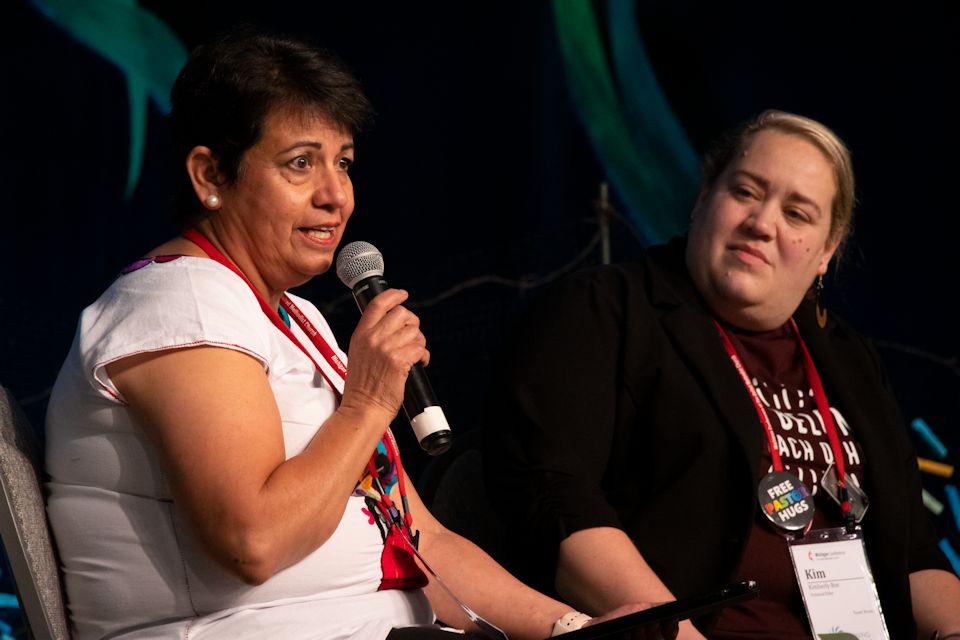
Hudson introduced the audience to the new EngageMI guidebook. “It will connect you to mission in our world,” she said. Copies were available at the conference and were also mailed to local churches. The 2022-2023 edition of the book is also available online.
A video, “Michigan Conference Incubation” lifted up ministries “no one congregation could launch or undertake on their own.” The Rev. Paul Perez introduced the story of three non-profits developed over the past 15 years by The Michigan Conference: Michigan Disaster Response and Recovery (MiDRR), Justice For Our Neighbors-MI (JFON), and Flint Freedom School Collaborative. Watch the video here. “Together we can do so much good!” Perez stated.
Bishop Bard stated after the last visioning presentation, “We wanted more time this year to hear stories about how God is at work in people’s lives. That’s the heart of who we are. I don’t diminish legislation but celebrating connectionalism is important. Every vision story you have heard this week is a part of YOUR story. We are connected, and you are a part of that. There is always more good to be done than any one of our churches can do.”
Click here to learn of other vision-inspired efforts of The Michigan Conference as shared in the 2022 Conference Report Gallery.
Last Updated on October 23, 2023

